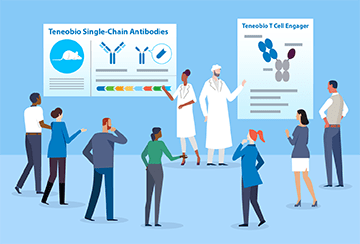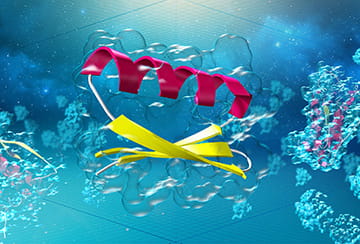Cancer treatments have traditionally fit into one of three categories: chemotherapy, surgery or radiation. In recent years, new approaches and innovative modalities — such as immuno-oncology or therapies targeting specific genetic mutations — have started to reshape how oncologists think about treating many cancers.
Amgen has been serving cancer patients for nearly 30 years, and in that time has become a leader in the development of innovative cancer therapies. Many cancer patients continue to face significant unmet needs, and Amgen is working to deliver new therapies to enhance outcomes for patients with hard-to-treat cancers. One exciting area of innovation is the potential for Amgen’s Bispecific T-cell Engager (BiTE®) platform to engage the body’s immune system against many different stages and types of cancers.
Here’s a look at important information about the BiTE platform, including what it is and how it’s designed to work.
What is BiTE technology?
BiTE molecules can be designed to engage the body’s immune system against specific targets found in some cancers. BiTE technology is a novel approach that can be adapted against a range of targets, and Amgen is currently investigating the platform’s applications in a number of blood cancers and solid tumors.
Amgen’s original BiTE molecules are relatively small proteins designed to clear the body with a typical half-life of a few hours, requiring continuous IV infusion of the medicine and repeat administration. Amgen has also developed half-life extended (HLE) BiTE molecules, which are larger, take longer to clear from the body, and are currently under investigation to assess less-frequent dosing schedules for patients.
How does BiTE work?
A person’s immune system includes T cells that seek and destroy foreign invaders called antigens. Unlike viruses or bacteria that come from the outside world, cancers are mutations of the body’s own cells, and these malignant cells can disguise themselves from the immune system. BiTE molecules are engineered combinations of two different antibody fragments — one side connects to T cells, while the other side can be designed to engage with a tumor-associated antigen.
“BiTE molecules are designed to act like a pair of spectacles to help the immune system see and engage with a target on the surface of the cancer cells,” says Greg Friberg, Amgen’s vice president and head of global development for the hematology/oncology therapeutic area. “Then the other side of the molecule is designed to pull in T cells to help fight it.”
Who are potential candidates for BiTE therapies?
The field of immuno-oncology has seen significant advances for patients with certain types of cancers, but many more still need additional therapeutic options. The BiTE platform could lead to new therapeutic pathways for patients who lack additional treatment options.
“Amgen is investigating dozens of BiTE molecules across both solid and hematological malignancies,” says Peter Kufer, vice president and innovator of BiTE Technology at Amgen. “This includes a DLL3-targeted BiTE molecule in small-cell lung cancer, a BCMA-targeted BiTE molecule in multiple myeloma, a PSMA targeted BiTE molecule in prostate cancer, and CD33 and FLT3-targeted BiTE molecules in acute myeloid leukemia.”
Why are innovations like BiTE technology so important?
One key benefit of the BiTE platform is its versatility. This potential to adapt BiTE molecules for a range of different types and stages of cancers may have far-reaching applications. “Researchers are investigating these molecules in patients with high and low tumor burden across different age groups, in those with rapidly progressing disease and across different treatment lines,” Kufer says.
Another key benefit is that BiTE molecules are being designed with the goal of leading to off-the-shelf therapies, without the need to manipulate an individual patient's T cells outside the body, as is currently the case with other cell-based immunotherapies. The development of BiTE therapies therefore has the potential to help expand the availability, and accessibility, of immuno-oncology for cancer patients who currently face significant unmet needs.
“I joined Amgen to help bring transformational medicines to cancer patients,” says PK Morrow, Amgen’s vice president and global therapeutic area head of Hematology. “Amgen’s pipeline has never been as broad in terms of targets and diseases that we’re targeting, spanning from small molecules to BiTE molecules and beyond.”



